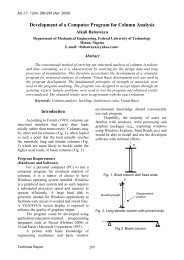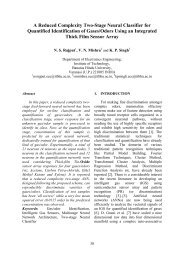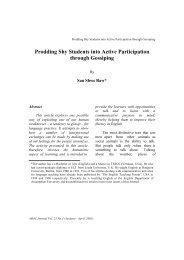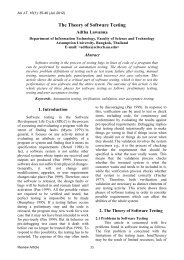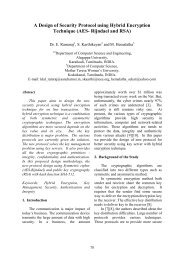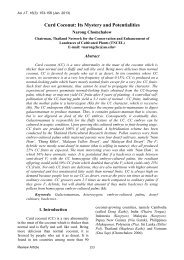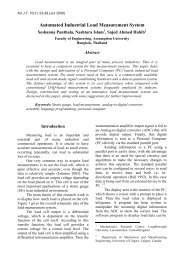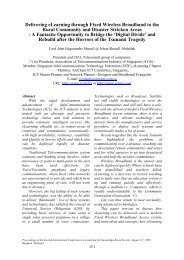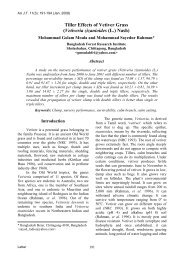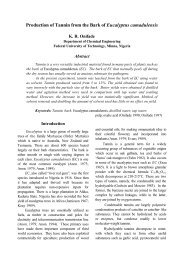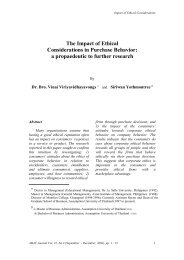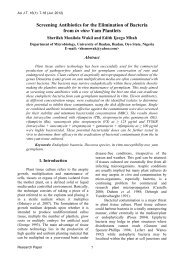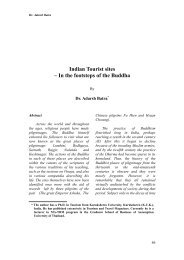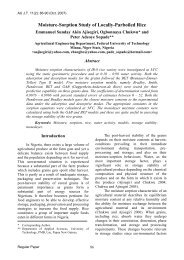PDF format - AU Journal - Assumption University of Thailand
PDF format - AU Journal - Assumption University of Thailand
PDF format - AU Journal - Assumption University of Thailand
You also want an ePaper? Increase the reach of your titles
YUMPU automatically turns print PDFs into web optimized ePapers that Google loves.
an important language for <strong>Thailand</strong> and 10= 5.0% 181=95% 100%<br />
Thai business dealings and in<strong>format</strong>ion<br />
do not like other languages 2=1.0% 189=99% 100%<br />
to be able to speak many languages 1=0.5% 190=99.5% 100%<br />
to improve one’s social status 1=0.5% 190=99.5% 100%<br />
to be different from other people 1=0.5% 190=99.5% 100%<br />
Summary <strong>of</strong> Research Findings and<br />
Suggestions for Further Research<br />
What is clear is that (a) there is<br />
very little detailed, reliable research<br />
evidence about how English is actually<br />
taught/learned at schools and<br />
universities in <strong>Thailand</strong>, (b) there is<br />
very little evidence that standards are<br />
improving significantly. The objectives<br />
outlined in the various curricula at<br />
different levels <strong>of</strong> education in <strong>Thailand</strong><br />
cover a wide variety <strong>of</strong> skills and, if<br />
successfully achieved, should ensure<br />
that students are highly pr<strong>of</strong>icient in<br />
English. However, there is a wide gap<br />
between general objectives statements<br />
and specific achievement. To address<br />
the above problems, it is suggested that<br />
further research be carried out to<br />
answer the following questions: what is<br />
actually happening in relation to the<br />
teaching <strong>of</strong> English in the Thai school<br />
and university systems? What exactly<br />
are the syllabus contents currently being<br />
used at both school and university<br />
levels and how effective are the various<br />
courses?<br />
In the area <strong>of</strong> examinations,<br />
research is need to answer the following<br />
questions: what factors are most likely<br />
to lead to successful examination<br />
performance by students? What type <strong>of</strong><br />
examinations should be made<br />
available?<br />
Follow up studies <strong>of</strong> actual<br />
classroom behaviour and perception <strong>of</strong><br />
teachers and students about what is<br />
being taught and learnt are clearly<br />
required. This study indicates that<br />
teachers may not necessarily be doing<br />
what they believe they are doing, or<br />
believe they ought to be doing. Only<br />
observation <strong>of</strong> what is actually<br />
happening in classrooms will reveal the<br />
extent to which perception and reality<br />
match.<br />
Anecdotal Evidence<br />
Many comments were made (and<br />
negative reactions received) about the<br />
length and purpose <strong>of</strong> the<br />
questionnaires used in this study. One<br />
or two lecturers asked if the researcher<br />
was testing their knowledge <strong>of</strong> the<br />
theories <strong>of</strong> second/foreign language<br />
teaching. Several expressed suspicion<br />
about the researcher’s motivation,<br />
believing she wanted to obtain inside<br />
in<strong>format</strong>ion about the teaching and<br />
learning <strong>of</strong> English in their institutions.<br />
Some teachers said the questionnaire



